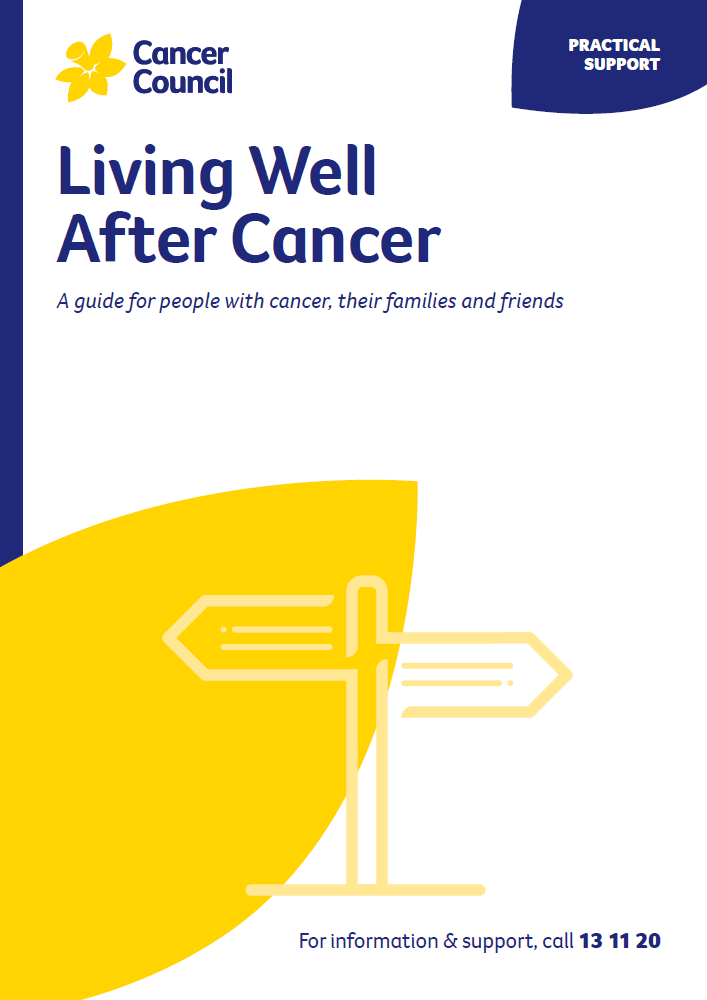- Home
- About Cancer
- Living well
- Living well after cancer
- Follow-up care
- Survivorship care plans
Survivorship care plans
Some treatment centres now develop survivorship care plans for people as they approach the end of treatment.
These plans usually:
- provide a cancer treatment summary
- set out a clear schedule for follow-up appointments and screening tests, including contact details for the health professionals involved in your treatment and ongoing care
- list any symptoms to watch out for and possible long-term side effects
- identify your medical, emotional, psychological or social needs after treatment and ways to manage them
- explain the roles and responsibilities of different members of your health care team and who to contact if you are worried
- suggest ways to adopt a healthy lifestyle after treatment.
A survivorship care plan can help improve communication between you, your family and all the health professionals involved in your care. The plan is not a fixed document; it should be reviewed regularly as your needs change. You can ask your health professionals to update your plan during consultations.
If you have not been given a survivorship care plan, ask your treatment team if they can prepare one. Another option is to develop your own plan and review it with your treatment team. The Australian Cancer Survivorship Centre provides a template you can download and fill out. Visit Peter Mac and search for “Life after treatment resources”.
If you’ve been treated for early breast, bowel or prostate cancer, cancer of the uterus or non-Hodgkin lymphoma, visit mycareplan.org.au to generate your own survivorship care plan.
Rehabilitation (rehab) can help you regain physical strength and get back to your daily activities. It may include physical therapy (e.g. in a pool or gym), or specialist care if you need help with speaking, eating, walking and other tasks. Talk to your health care team about whether this would help your recovery.
→ READ MORE: Follow-up appointments
More resources
Prof Michael Jefford, Medical Oncologist and Director, Australian Cancer Survivorship Centre, Peter MacCallum Cancer Centre, VIC (clinical review); Lucy Bailey, Nurse Counsellor, Cancer Council Queensland; Philip Bullas, Consumer; Dr Kate Gunn, Clinical Psychologist and Senior Research Fellow, Department of Rural Health, University of South Australia, SA; Rosemerry Hodgkin, 13 11 20 Consultant, Cancer Council WA; Prof David Joske, Clinical Haematologist, Sir Charles Gairdner Hospital and Clinical Professor of Medicine, The University of Western Australia, WA; Kim Kerin-Ayres, Clinical Nurse Consultant, Cancer Survivorship, Concord Hospital, NSW; Sally Littlewood, Physiotherapist, Seymour Health, VIC; Georgina Lohse, Social Worker, GV Health, VIC; Melanie Moore, Exercise Physiologist and Clinical Supervisor, University of Canberra Cancer Wellness Clinic, ACT; June Savva, Senior Clinician Dietitian, Nutrition and Dietetics, Monash Cancer Centre, Monash Health, VIC; Dr Elysia Thornton-Benko, Specialist General Practitioner and Research Fellow, University of New South Wales, NSW; Prof Janette Vardy, Medical Oncologist, Concord Cancer Centre and Professor of Cancer Medicine, The University of Sydney, NSW; Lyndell Wills, Consumer.
View the Cancer Council NSW editorial policy.
View all publications or call 13 11 20 for free printed copies.

